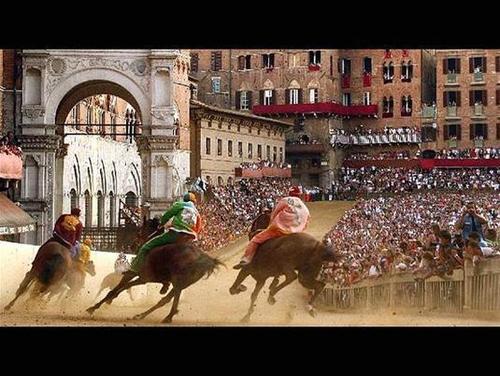See on Scoop.it - Good Things From Italy - Le Cose Buone d’Italia
Let’s make something clear right away: the Palio is anything but folklore. The 75 seconds that the horses need to race the three laps around the Campo, on the 2nd of July and the 16th of August, in fact, last all year round.
Because life takes place in the contrade, the quarters, or neighbourhoods, which divide the city. Each one has its church, its fountain, in which every baby receives his contrada’s baptism. Each one also has an office which, in the end, is not much different from any club: where people play cards, organize trips and excursions and meet to watch football games on giant screens. But with a passion and an extraordinary mission: the one for the Palio. It would take a book to tell everything there is to tell about the Palio. To try and summarize is to run the risk of leaving out important details and not stressing adequately the attraction of a race that is absolutely unique. But we’ll try anyway.
The contrade are 17 and they are very ancient, going back to the Renaissance. However, only 10 of them take place on the square for each Palio. These are the 7 that were left out the previous year, plus three which are chosen by luck of the draw. And the same happens on the 16th of August. The ceremony and the way the approach to the race is lived have an incomparable power of seduction. Starting from the draw of the three lucky contrade. Then, the secret negotiations to enrol a skilled jockey (they are always the same, famous, in great demand, loved and loathed, just like the stars in other sports). The horses are assigned to each contrada by draw too, this is called the “tratta” and it gives place to the most important decision: if the Barbary (the horses are all from this breed) is considered a winner, based upon the results of the other palios in the province, one “goes to win,” in other words a contrada can aim for victory. If, instead, the horse isn’t worthy of trust, the people will decide to race against a rival contrada, because all the contrade (or almost) have one or more loyal allies, but also one or two sworn enemies. And there is no bigger disgrace than the victory of the Palio by a rival contrada.
Victory justifies any means: corruption, flogging (to strike a rival with the “frustino” or riding whip), which the jockeys exchange on the starting line. There are also people who would go as far as to sedate the horse of a rival contrada, this is why, after the “tratta,” a group of people from each contrada never leave their horse out of their sight, they keep watch, they nurse him, they feed him. And the morning of the Palio, they take the horse to church, to receive the blessings of the contrada’s priest.
See on panoramitalia.com
via Tumblr http://italianentertainment.tumblr.com/post/37131415541
